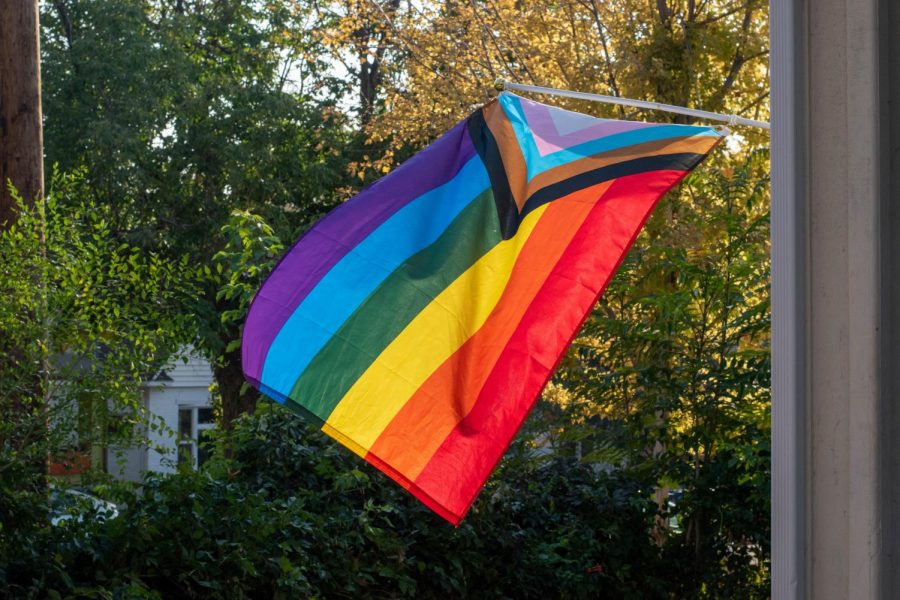Cushman: We Need to Hold Queer Influencers Accountable
A Progress Pride Flag hangs from a house in Salt Lake City, Utah on Sept. 21, 2020. (Photo by Gwen Christopherson | Daily Utah Chronicle)
April 30, 2021
I love “The Bachelor.” I watch every season, every spinoff and follow several “Bachelor” fan pages on Twitter. I also know how rarely the show produces successful relationships, so I rooted for Season 23’s lead, Colton Underwood, and his final pick Cassie Randolph. So, I understandably felt shocked and angry when Randolph filed a restraining order — which she later dropped — against Underwood for stalking her. It was hard to see a relationship I watched grow become toxic and harmful. Because of this, I felt a lot of mixed emotions when Underwood came out as gay in a Good Morning America interview. It is exciting to see Underwood finally living his truth and accepting himself. However, I can only imagine how hard it was for Randolph to see the man who stalked and terrified her being praised on national TV with little to no discussion of the stalking allegations. Being a part of the LGBTQ+ community should not remove any of Underwood’s culpability; he should still face the consequences of his actions — as should other members of the community.
In Underwood’s GMA interview, he candidly spoke about his struggle coming to terms with his sexuality. He talked about using his role in “The Bachelor” to reaffirm his straightness both to himself and the world. It reminds us that, even now, more than five years after the United States legalized gay marriage and with a widespread acceptance for the LGBTQ+ community, growing up queer in the United States is still difficult. LGBTQ+ students in high school have reported rates of suicide attempts that are two to seven times higher than their heterosexual peers. We still have work to do to end LGBTQ+ discrimination in the United States.
I sympathize with Underwood’s struggle and the struggle of the LGBTQ+ community as a whole. However, especially in Underwood’s original coming-out interview, little was said about the stalking allegations against him. Since then, more footage has come out of Underwood briefly addressing the situation. “I made a lot of bad choices,” he said in unreleased footage from the GMA interview. Underwood would later go on to explain that his struggle with his sexuality led him to actions he was not proud of.
While I cannot speak to the experience of being a gay man, I can speak to that of being a woman. I’ve had scary encounters with men that made me clutch my pepper spray tighter as I walked to my car after work. I’ve felt relieved to move apartments so my ex-boyfriend wouldn’t know my address anymore. Thinking of any woman being put in that position breaks my heart because I’ve been there and I know how terrifying it is. No one should have to live with that constant fear — and nothing can justify it.
However, despite the severity of Underwood’s actions, some happily sweep it under the rug and focus on his journey since his coming out. He even partnered with Netflix to make a reality show about his life as an out-of-the-closet gay man. Thirty-five thousand people, as of April 26, have signed a petition to cancel the show.
This situation emblematizes a wider problem within the LGBTQ+ community. For example, James Charles, a gay beauty influencer, has been accused of sexual misconduct since May 2019, but only after Charles made a public statement admitting to sexting underage boys this past April did YouTube demonetize his account. While this is a step in the right direction, it shouldn’t take two years of allegations for an influencer to face consequences for sexual misconduct.
Jessica Yaniv, a Canadian transgender woman who gained notoriety for filing a number of lawsuits against beauticians, has allegedly sent inappropriate messages to underage girls. Despite many girls coming forward to share inappropriate direct messages from Yaniv, she faces few repercussions for that.
To be clear, I don’t think Underwood, Charles or Yaniv intentionally use their queer identities to shelter themselves from controversy. But there may be a greater hesitancy to call them out for their mistakes than there might be for someone outside of the queer community. By allowing queer people who do bad things to avoid scrutiny, we make a more dangerous space for everyone in the community. When you look up their names, not many left-wing or LGBTQ+ affirming outlets report on them. This coverage bias inherently harms the LGBTQ+ community because more likely than not, right-leaning media misgenders or deadnames transgender people — behavior that becomes normalized to their audience. However, if LGBTQ+ affirming news outlets held queer influencers accountable for their actions, they could cover it in a way that does not normalize harmful behavior and instead dismantles the false and harmful stereotype that queer people are more likely to engage in deviant behavior.
Predators should be removed from platforms where they can hurt people. Queer influencers like Underwood should not be made into queer role models if they are engaging in dangerous and harmful behavior, especially when there are other great queer people to look up to. The reality is people from every community cause harm, but hesitancy to call out that behavior, when it is done by people in the LGBTQ+ community only, hurts that community by perpetuating bigotry and making it a more unsafe space for everyone.








